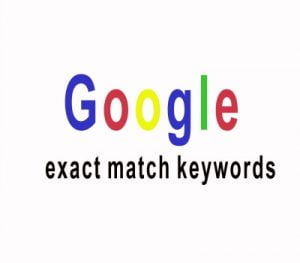

Google Adwords Definitions Are Changing To Exact Match Keywords
Google Adwords definitions are changing to “exact match” keywords to match to even more variants. Starting in a few weeks Google has announced that they will be using “exact match” keywords, which will get less exact, and match to even more keyword variants going forward. Exact-match phrase is more commonly used when you are targeting your ad to certain types of searches with Google AdWords. By using exact-match in Google AdWords you are only allowing your ad to show up for a specific word or phrase used.

What are the exact-match keywords?
Exact-match keywords are an important feature in today’s online world. They are a key feature in your content (organic or paid for ads) getting found. Once we understand the phraseology the user is using (and the intent behind the search) we can implement exact match key phrases across the website (on page search engine optimisation) or on social media platforms.
In this context, we are talking about exact-match keywords within the Google Adwords system. It is a keyword match type which allows the users to advertise on a specific exact-match search.

So what is Google changing?
Advertisers need to be able to control how keywords are matched out with regard to users search intent. A successful Google Adwords ad originally worked when the use of exact match keywords was implemented. This would only serve an ad when a user used an exactly matched keyword/key phrase. If a user didn’t type an exact word then the ad wasn’t seen.
Over the last four years, Google’s definition of “exact match” relaxed, allowing for misspellings, plurals, and other grammatical issues. Last year in 2017, Google reinvented exact match keywords. They did this by automatically serving ads to searches, even where words from the keyword weren’t in order, or included prepositions, conjunctions, or even articles.
Starting in October this year, Google will begin to match exact match keywords to “close variants that share the same meaning of your keywords,” these will include paraphrases, synonyms, and the result will have the same implied intent.
When Google updated their exact match keyword searches last year, results showed that advertisers saw a 10% increase in their clicks and 11% increases in their spend. It is believed with this new update that the changes will increase the reach of exact match keywords by approximately 3%.
Who is going to benefit from this change?
All advertisers will be affected in some way or another regarding the changes been made to keywords. Small business advertisers may benefit from this change being introduced, as it will cut down on time spent on having to add new keywords on a frequent basis.

Ways to help you get prepared for the New Exact Match Keywords
Google plans to start rolling out these changes next month, starting with English keywords and will then follow with other language keywords. Here are some tips to help you get ready.
- Review your top exact match keywords Check out what your top exact match keywords are. Which ones are the most popular? Ask yourself the following questions to see if the keyword will still work. How many words are in the key phrase? Is it more than one, two etc.? If you were to change a word in the keyword would it change the meaning of the search? (This is becoming much more important in terms of contextual search, particularly with regard to voice search).
- Preemptively add new negative keywords A PPC manager will know that adding new negative keywords is a very important part of Adwords strategy. After you add exact match keywords, you should review to make sure that any traffic resulting from the keywords is relevant to your search. If they aren’t relevant, then you need to add them as a negative keyword. This will help to prevent losing any unnecessary spend on budget.
- Consider adding other match types Google have stated that with this change on exact match keywords will not affect the “phrase match” keywords. You should also consider adding some changes to your modified broad match keywords on your account.
- Remove any newly duplicate keywords Changes made last year, regarding the rules for exact match keywords, resulted in keywords been shifted, and causing some keywords to compete against other keywords. You may see noticeable changes on your duplicate keyword count.
- Revisit your Single Keyword Ad Groups Single keyword ad groups are loved by some advertisers as it allows them to match an ad perfectly with a single word. However, whilst it does give control, it can also cause more search terms to be linked to the word. This may result in overspend on budget.



